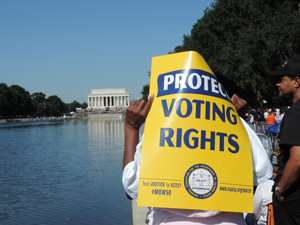
You cannot run a marathon — or walk a half-marathon — the first time you step outside your door wearing a comfortable pair of walking shoes and a hydration belt. Theoretically, if your life or the life of your loved one depended on it, you might try and you might even succeed. But you will hurt yourself… every runner or walker I’ve spoken to has told me that a race is a challenge even when you are ready for it. Similarly, very few social changes occur the first time an agitator stands on a street corner and proclaims that a great wrong must be corrected. Just ask Susan B. Anthony; one of her tireless efforts was writing and publishing the history of the suffrage movement.
This weekend our country began to celebrate the anniversary of the March on Washington for Jobs and Freedom. These anniversary observances are both celebrations and protests — we’ve come so far, and we’ve got so much farther to go. Jelani Cobb catches the spirit well in his New Yorker article, insisting that we have grown enough to both recognize our incredible progress and insist that it be protected and further developed. Our collective memory tends towards mythologizing strong individuals like Martin Luther King, Jr. and Rosa Parks and in doing so, we lose our sense of joint ownership and team accomplishment. We turn history into a series of dates and turning points instead of a flowing river of human endeavor.
Roberto and I joined the festivities for a few hours on Saturday, and it struck me that our civil rights movement is a marathon, a long-distance relay through generations that keep pointing towards that ever elusive finish line where we break through the tape of fear wrapped in ignorance with a strong dose of selfishness and finally “transform the jangling discords of our nation into a beautiful symphony of brotherhood.”
Back in his day, Martin Luther King and the men who organized the original march made their wives and female colleagues like Dorothy Height and Rosa Parks walk a separate route, away from the media. They allowed only a short ovation to six pre-selected women Daisy Bates, the leader of the Little Rock Nine who gave a brief statement(listen here); Prince Lee, the widow of murdered activist Herbert Lee, Diane Nash, a key leader of the freedom rides; Gloria Richardson, and Rosa Parks.
Myrlie Evers was also scheduled to be onstage and got a huge ovation in absentia; circumstances intervened in 1963. This year, like so many other women, she got the opportunity to speak:
[youtube=http://www.youtube.com/watch?v=P1aY94UtLMk&w=420&h=315]
I love that she encouraged us to turn “Stand Your Ground” into a positive force for change, remember the women who worked so hard for the movement, and be trees standing tall for justice.
Let’s keep standing, marching, walking — and running — together. All of us.
One reply on “Marching, Walking, Running and Standing for Justice”
[…] Marching, Walking, Running and Standing for Justice (lisahelene.wordpress.com) […]